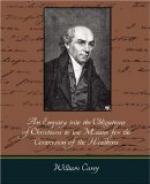When he arrived at Rome he addressed his countrymen the jews, some of whom believed; but when others rejected the gospel, he turned from them to the gentiles, and for two whole years dwelt in his own hired house preaching the kingdom of God, and teaching those things which concern the Lord Jesus Christ, with all confidence, no man forbidding him.
Thus far the history of the Acts of the Apostles informs us of the success of the word in the primitive times; and history informs us of its being preached about this time, in many other places. Peter speaks of a church at Babylon; Paul proposed a journey to Spain, and it is generally believed he went there, and likewise came to France and Britain. Andrew preached to the Scythians, north of the Black Sea. John is said to have preached in India, and we know that he was at the Isle of Patmos, in the Archipelago. Philip is reported to have preached in upper Asia, Scythia, and Phrygia; Bartholomew in India, on this side the Ganges, Phrygia, and Armenia; Matthew in Arabia, or Asiatic Ethiopia, and Parthia; Thomas in India, as far as the coast of Coromandel, and some say in the island of Ceylon; Simon, the Canaanite, in Egypt, Cyrene, Mauritania, Lybia, and other parts of Africa, and from thence to have come to Britain; and Jude is said to have been principally engaged in the lesser Asia, and Greece. Their labours were evidently very extensive, and very successful; so that Pliny, the younger, who lived soon after the death of the apostles, in a letter to the emperor, Trajan, observed that Christianity had spread, not only through towns and cities, but also through whole countries. Indeed before this, in the time of Nero, it was so prevalent that it was thought necessary to oppose it by an Imperial Edict, and accordingly the proconsuls, and other governors, were commissioned to destroy it.
Justin Martyr, who lived about the middle of the second century, in his dialogue with Trypho, observed that there was no part of mankind, whether greeks or barbarians, or any others, by what name soever they were called, whether the Sarmatians, or the Nomades, who had no houses, or the Scenites of Arabia Petrea, who lived in tents among their cattle, where supplications and thanksgivings are not offered up to the Father, and maker of all things, through the name of Jesus Christ. Irenaeus, who lived about the year 170, speaks of churches that were founded in Germany, Spain, France, the eastern countries, Egypt, Lybia, and the middle of the world. Tertullian, who lived and wrote at Carthage in Africa, about twenty years afterwards, enumerating the countries where Christianity had penetrated, makes mention of the Parthians, Medes, Elamites, Mesopotamians, Armenians, Phrygians, Cappadocians, the inhabitants of Pontus, Asia, Pamphylia, Egypt, and the regions of Africa beyond Cyrene, the Romans, and Jews, formerly of Jerusalem, many of the Getuli, many borders of the Mauri, or Moors, in Mauritania; now Barbary, Morocco, &c. all




